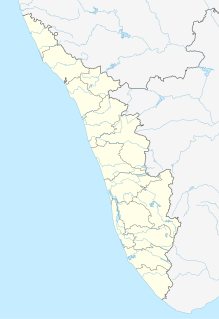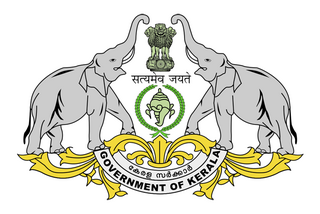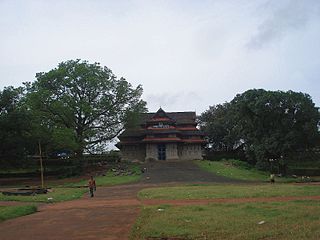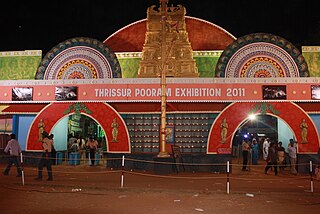Related Research Articles

Thrissur, formerly Trichur, also known by its historical name Thrissivaperur, is a city and the headquarters of the Thrissur district in Kerala, India. It is the fourth largest city in Kerala after Trivandrum, Kochi and Kozhikode, and the 21st largest in India. It is famous for the Thrissur Pooram festival.

The Thrissur Pooram is an annual temple festival held in Thrissur, Kerala, India. It is held at the Vadakkunnathan (Shiva) Temple in Thrissur every year on the Pooram day—the day when the moon rises with the Pooram star in the Malayalam Calendar month of Medam. It is the largest and most famous of all poorams.

Guruvayur is a municipal temple town in Thrissur District, of Kerala State in India It is a suburban town of Thrissur city, located 28 kilometres (17 mi) from Thrissur towards the north-west. It houses the famous Guruvayur Shri Krishna Temple. It is located at a distance of 645 km (401 mi) from Chennai towards the south-west, 292 km (181 mi) from the state capital Trivandrum towards the north-west, 80 km (50 mi) from Kochi towards the north,141 km (88 mi) from Coimbatore towards the south-west,285 km (177 mi) from Tenkasi towards the north-west.

Irinjalakuda is a municipal town in Thrissur district, Kerala, India. Irinjalakuda is a revenue division and the headquarters of Mukundapuram Taluk. It is known for the Koodalmanikyam Temple and the Thachudaya Kaimals who had princely status until 1971.

Thrissur is a district of Kerala situated in the central part of that state. Spanning an area of about 3,032 km2 (1,171 sq mi), Thrissur district is home to over 9% of Kerala's population.

The Arattupuzha Temple is a Hindu temple situated at Arattupuzha in Thrissur district of Kerala in India, administered by Cochin Devaswom Board.

Thriprayar Shree Ramaswami Temple is Hindu temple situated in Triprayar in Thrissur district of Kerala state in India. The deity is Lord Rama, the seventh incarnation of Lord Vishnu, with four arms bearing a conch, a disc, a bow and a garland. The temple is situated on the bank of river Theevra. The temple deity is the presiding deity of Arattupuzha Pooram. It is believed that the idol here was worshipped by Lord Krishna, another avatar of Lord Vishnu in Dwarka. Along with Lord Rama, there are shrines for Lord Shiva as Dakshinamoorthy, Lord Ganesha, Lord Sastha and Lord Krishna. It is the first among the four temples housing the four sons of King Dasharatha, popularly known as Nalambalams, the others being Koodalmanikyam Temple in Irinjalakuda housing Bharata, Thirumuzhikoolam temple housing Lakshmana and Payammal housing Shatrughna in that order. It is believed that worshipping these temples on a single day in the Malayalam month of Karkadakam is very auspicious, and thus many devotees visit these temples. Thriprayar temple used to be owned & administered by the 3 famous Nambudiri families namely Cheloor mana, Janappilly Mana and Punnappilly Mana before it was handed over to the Cochin Devaswom Board. Still, the heads of these three families serve as the Ooralans of the temple and take part in the rituals and festivals in accordance with the customs.

Thrissur is the administrative capital of Thrissur District situated in the central part of Kerala state, India. Thrissur district was formed on 1 July 1949. It is an important cultural centre, and is known as the Cultural Capital of Kerala. It is famous for the Thrissur Pooram festival, one of the most colourful and spectacular temple festival of Kerala. From ancient times, Thrissur has played a significant part in the political, economical and cultural history of Indian sub continent and South East Asia. It has opened the gates for Arabs, Romans, Portuguese, Dutch and English. Thrissur is where Christianity, Islam and Judaism entered the Indian sub continent, when Thomas the Apostle arrived in 52 CE and the location of country's first Mosque in the 7th century.

The Government of Kerala, formally and commonly referred to as Kerala Government is the state government of the Indian state of Kerala. The government is led by the chief minister, who selects all the other ministers. The chief minister and their most senior ministers belong to the supreme decision-making committee, known as the cabinet.
Devaswom are socio-religious trusts in India that comprise members nominated by both government and community. Their aim is to manage Hindu temples and their assets and to ensure their smooth operation in accordance with traditional rituals and customs. The devaswom system notably exists in the state of Kerala, where most temples are either managed by Government of Kerala-controlled devaswoms or formed by private bodies/families. The properties of each temple are deemed to be the personal property of the presiding deity the temple and are managed through a body of trustees who bear allegiance to the presiding deity.
Nalambalam is a set of four Hindu temples in Kerala. In Malayalam, Nalu means "four" and Ambalam means "temple". These are the temples for the Rama and his brothers of Ramayana. There are around five sets of Nalambalams in Kerala, the most famous among them being the four temples located in Thrissur and Ernakulam districts, namely Thriprayar Sree Rama Temple, Koodalmanikyam Bharatha Temple, Moozhikkulam Lakshmana Temple and Payyammal Shathrughna Temple.

Annamanada Mahadeva Temple is a Hindu located at Annamanada in Thrissur District, Kerala. The presiding deity of the temple is Shiva. The shivling is almost four feet tall and is considered as the Kiratamoorthy in a pleasing mood while giving Pashupatastra to Arjuna. The temple is being administered by the Cochin Devaswom Board.

Ramavarmapuram is the northern suburb of Thrissur City in Kerala. This suburban area is home to several governmental and other institutions of national importance. The largest menhir type megalithic monument in granite in Kerala is found here. A local catholic church has recently been adorned with mural paintings in the traditional Kerala style. This is the first instance of such a church decoration in Kerala in modern times.

Vadakkechira is one of the four oldest ponds in Thrissur city of Kerala in India. It was built by Shakthan Thampuran (1751-1805) and is one of Thrissur's famous landmarks. It is owned by Cochin Devaswom Board.

Thekkinkadu Maidanam is situated in the middle of Thrissur city of Kerala state in India. This hillock which seats the Vadakkumnathan Temple, is an open ground in the centre of the Thrissur city which is under the custody of the Cochin Devaswom Board (CDB). It hosts the spectacular cultural festival Thrissur Pooram, which is considered the Mother of all Poorams in Kerala.
Thanikkudam Bhagavathi Temple is a Hindu Temple located in Thanikkudam of Thrissur city in Kerala, on the banks of Puzhakkal River, also called Thanikkudam river. It is dedicated to Goddess Bhadrakali, in the form of 'Nanadurga'. It is famous for 'arattu' ceremony during monsoon season, when the river is flooded and enters the main sanctum, thus submerging the whole idol. This temples is one of the rare temples with such a ceremony. The temple is under the control of Cochin Devaswom Board.

Thrissur Pooram Exhibition or commonly known as the All India Agricultural, Industrial, Educational and Cultural Exhibition is an exhibition organised jointly by Paramekkavu Bagavathi Temple Devaswom and Thiruvambadi Sri Krishna Temple Devaswom, ahead of Thrissur Pooram in Thekkinkadu Maidan in Thrissur city. It is usually conducted over a period of 40 to 50 days during the Thrissur Pooram.The exhibition is the largest in Kerala in terms of attendance and floor space.
Laloor Bhagavathy Temple is a Hindu temple situated in Laloor, Thrissur City of Kerala. Cochin Devaswom Board controls the temple. The temple is a participant in the Thrissur Pooram every year. It is one of the 108 Durga Temples in Kerala found by Saint Parasurama.
Administration of Thrissur is handled by the Thrissur Municipal Corporation, consisting of 55 councilors and headed by the city's mayor.
References
- ↑ "New panel for Devaswom Board". The Hindu. Retrieved 31 May 2013.CS1 maint: discouraged parameter (link)
- ↑ "New Cochin Devaswom chief". The Hindu . 16 July 2010. Archived from the original on 20 July 2010. Retrieved 31 May 2013.CS1 maint: discouraged parameter (link)
- ↑ "Cochin Devaswom Board plans temple development". The Hindu . 19 September 2007. Archived from the original on 18 January 2008. Retrieved 31 May 2013.CS1 maint: discouraged parameter (link)
- 1 2 "Thirteenth Kerala Legislative Assembly" (PDF). Kerala Legislative Assembly. Retrieved 31 May 2013.CS1 maint: discouraged parameter (link)